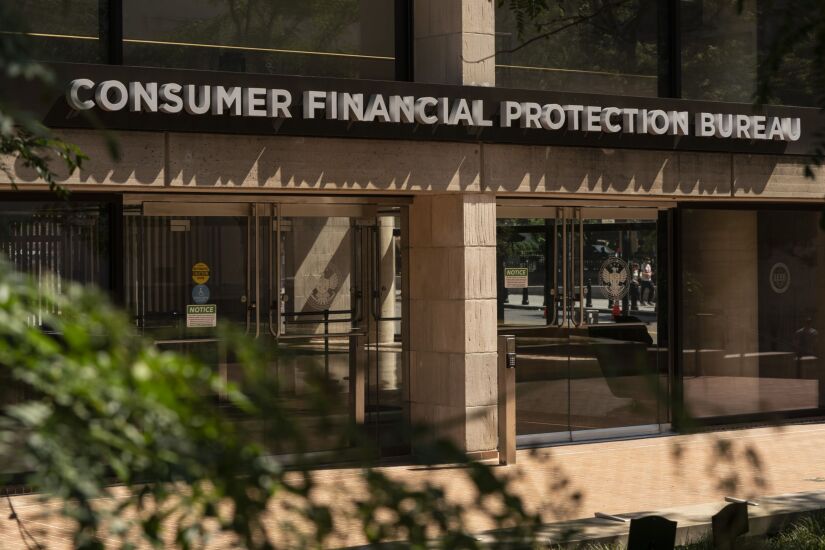In October's roundup of top banking news: Navy Federal's contract with the Department of Defense remains in limbo, check fraud takes a bite out of Regions Financial's third-quarter earnings, a Community Reinvestment Act rule gets finalized and more.

Navy Federal, NCUA deadlocked over Department of Defense contract
The Department of Defense established the overseas banking program after World War II to provide active-duty military members with retail, financial and cash services. The Vienna, Virginia-based
The agreement was already under fire from the banking industry, and now the National Credit Union Administration says federal law prevents it from insuring any accounts offered through the program.

Layoffs at PNC cut across business lines and geography
The Pittsburgh-based bank joins a growing list of banks, credit unions and fintech companies that have
PNC issued a statement acknowledging the job cuts, and saying that as part of its focus on managing expenses it is shifting "away from work that is not fully aligned to our strategic priorities." The $558-billion asset bank did not say how many employees received pink slips.

Check fraud leads to big Q3 charge at Regions Financial
Executives at the Birmingham, Alabama-based company warned that operational losses related to check fraud totaled $135 million between April and September, and will continue to weigh on the bank's future earnings.
After disclosing an $82 million loss related to check fraud in the second quarter, the $154 billion-asset bank reported a second scheme that was unknown to the bank three months earlier. The latest fraud scheme led to an additional $53 million loss during the third quarter, according to Regions CEO John Turner.

Wells Fargo's Mary Mack: The exit interview
Mack accepted her first banking job because her then-boyfriend, now-husband, whom she met while at Davidson College, was planning to practice law in South Carolina. (He still does; they had three daughters and expect to become grandparents this fall.)
As a college senior, she was tapped to travel around the country with the school's president and speak to business leaders about the value of a liberal arts education. After an informational session with three bank CEOs, all reached out with job offers — but only one, First Union, was willing to let her live in the Charlotte area, close to the South Carolina border.

Banks are at a 'tipping point' amid broad shift to nonbanks: McKinsey
The threat is largely tied to the ongoing shift of balance-sheet activities and transactions away from traditional banks to nonbank institutions, McKinsey warns in its 2023 annual review of global banking. That migration has gained such scale that banking is now at "a tipping point" that could "fundamentally alter the nature" of the industry, the McKinsey report states.
Between 2015 and 2022, more than 70% of the net increase in financial funds wound up not on U.S. banks' balance sheets, but instead at insurance and pension funds, sovereign wealth funds, in the private capital market and with retail and institutional investors, according to the report. Financial funds were defined as the sum of all personal financial assets and all institutional financial assets, except those held by banks.

5 ways merchants are fighting card-swipe fees at the point of sale
The existing systems supporting U.S. swipe fees are coming under pressure from at least three directions on political and legal fronts, briefly described below.
But merchants are also using technologies and policies to offset the cost of payment card swipe fees, helped by the rise of faster payments, new approaches to merchant-funded rewards and new U.S. regulations encouraging open banking.

Community Reinvestment Act rule finally crosses the finish line
"[It] will better achieve the purposes of the law by encouraging banks to expand access to credit, investment and banking services in low- and moderate-income communities," Fed Chair Jerome Powell said in a statement. He said it is adapted to "changes in the banking industry, such as mobile and online banking; providing greater clarity and consistency in the application of the CRA regulations; and tailoring to bank size and type."
The new rule, jointly released by the Federal Reserve, the Office of the Comptroller of the Currency and the Federal Deposit Insurance Corp. will go into effect on Jan. 1, 2026. The final rule redefines the asset size thresholds and methods with which regulators evaluate lenders. Small banks will be defined as having total assets of less than $600 million, an increase from the $376 million threshold under the current framework. Intermediate banks are defined as having total assets between $600 million to $2 billion and large banks as those having assets of $2 billion or greater.

Embracing fintech led to trouble for one small bank. So did the aftermath.
After nearly a year of turmoil, the company's new CEO
Since that interview was published, the stock price of parent company Blue Ridge Bancshares has fallen more than 50%, adding to a rout that was already underway. The market punished the bank when its compliance problems first surfaced, then punished it again when executives decided to scale back the bank's exposure to the fintech market.

Banking-as-a-service provider Synapse lays off staff, loses major client
Synapse, which provides technology that connects fintech companies and banks, said in an email that it laid off 112 employees — 86 of them full-time, the rest contractors — across job functions after losing a major client last week to long-time bank partner Evolve Bank & Trust.
"We deeply regret saying goodbye to incredibly talented and dedicated members of the Synapse team," the company said in an emailed statement. "However, we have a strong group in place to manage all of our operations and support our customers going forward."

Court puts CFPB small-business data collection rule on hold nationwide
A federal court has extended an injunction on the Consumer Financial Protection Bureau's small-business lending data rule to apply nationwide pending the outcome of a Supreme Court case
The Oct. 25 ruling by the U.S. District Court for the Southern District of Texas comes three months after a judge granted a limited preliminary injunction to members of two trade groups and a private bank that had sued the CFPB to keep the rule from going into effect.





